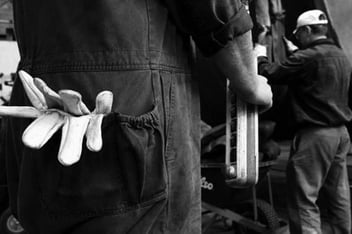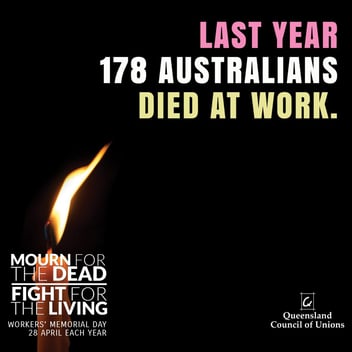Queensland shows the way on changing the rules for workplace safety
by Ros McLennan, General Secretary, Queensland Council of Unions
Research on community attitudes towards workplace safety shows governments and authorities must enact tougher laws or risk being run over by public opinion.
Further coordinated national action is needed as Australia’s workplace death toll for the calendar year 2019 stands at 30 fatalities as at 21 March 2019.
In 2018, the preliminary data show there were 157 Australian workers killed at work, compared with 190 workers in 2017.
In Queensland, the Office of Industrial Relations reports that from March 2018 to February 2019 there were 39 confirmed work-related fatalities reported in Queensland, with 15 more deaths being investigated.
Recent research shows public opinion on the side of the campaign for government action to end all forms of workplace injuries, including the increasing level of psychosocial injuries, and prevent further deaths at work.
Reachtel polling in February 2019 showed 58 per cent of Australians want new laws which would see employers who are responsible for workplace deaths held accountable and ultimately sent to jail, while 80 per cent want to see significant financial penalties for employers who don’t manage psychological hazards such as bullying and stress.
Around 62 per cent also believe that unions are important to improving workplace health and safety.
Some governments and authorities are moving but many – including the federal government – seem oblivious to community expectations.
Queensland has shown the way to jurisdictions across Australia, with concerted union and community pressure leading to new industrial manslaughter laws to address community concerns about work-related fatalities and injury.
A fundamental right we all have is to go to work and come home at the end of our day alive and safe. But this right, fought for and won by workers and their unions over years of struggle, is under threat through inaction by a federal government putting the interests of employers ahead of workers.
Increasing levels of job insecurity and casual employment further limit the confidence workers have to speak out about workplace safety, with the risk of having shifts withdrawn or contracts cancelled for speaking out.
Some state governments and safety authorities have backed union calls for greater focus on workplace safety.
Queensland’s Labor Government in 2017 was the first state to introduce industrial manslaughter laws. Bosses and corporations who kill workers by operating unsafe workplaces are now held accountable with significant gaol sentences and fines.
These are laws fought for and won by unions and their members – it’s hard to see how they would have been implemented without union pressure.
Now a recent review of Australia’s national model workplace health and safety laws has recommended that the offence of industrial manslaughter be included in the model laws, following the lead of Queensland and the ACT.
Marie Boland, former Executive Director of SafeWork SA, led the Review. She considered the new offence is required to address increasing community concerns that there should be a separate industrial manslaughter offence where there “is a gross deviation from a reasonable standard of care that leads to a workplace death”.
There is still much work ahead to address workplace safety. Silicosis in workers of engineered stone is fast reaching “epidemic” proportions, while mesothelioma deaths from exposure to asbestos continue to increase.
Workcover Queensland statistics show that work-related psychological injury continues to be a major concern for teachers, emergency services workers and health workers. More work and resources need to be devoted to these injuries which ripple damagingly through our communities.
At this time each year around Workers’ Memorial Day (observed on 28 April), we again call for jobs that keep workers safe and healthy. It’s time all levels of government made a commitment to stronger safeguards to prevent injuries and save lives.
Governments also need to back the right of all workers to raise job safety concerns without retaliation or prosecution and for the freedom of all workers to join their union and bargain for fair pay and safe workplaces.


